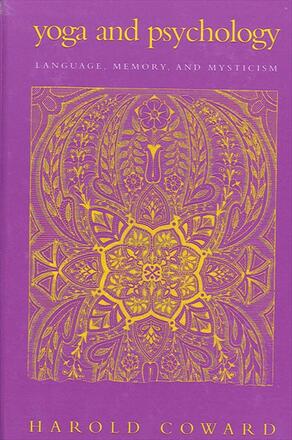
Yoga and Psychology
Language, Memory, and Mysticism
Alternative formats available from:
Explores the influence of yoga in the seminal Indian philosophy of Bhartrhari and in the Western psychology of Freud, Jung, and the transpersonalists, providing unique insights into the differences between Eastern and Western concepts of human nature.
Description
Harold Coward explores how the psychological aspects of Yoga philosophy have been important to intellectual developments both East and West. Foundational for Hindu, Jaina, and Buddhist thought and spiritual practice, Patañjali's Yoga Sutras, the classical statement of Eastern Yoga, are unique in their emphasis on the nature and importance of psychological processes. Yoga's influence is explored in the work of both the seminal Indian thinker Bhartrhari (c. 600 C. E.) and among key figures in Western psychology: founders Freud and Jung, as well as contemporary transpersonalists such as Washburn, Tart, and Ornstein. .
Coward shows how the yogic notion of psychological processes makes Bhartrhari's philosophy of language and his theology of revelation possible. He goes on to explore how Western psychology has been influenced by incorporating or rejecting Patañjali's Yoga. The implications of these trends in Western thought for mysticism and memory are examined as well. This analysis results in a notable insight, namely, that there is a crucial difference between Eastern and Western thought with regard to how limited or perfectible human nature is—the West maintaining that we as humans are psychologically, philosophically, and spiritually limited or flawed in nature and thus not perfectible, while Patañjali's Yoga and Eastern thought generally maintain the opposite. Different Western responses to the Eastern position are noted, from complete rejection by Freud, Jung, and Hick, to varying degrees of acceptance by transpersonal thinkers.
Harold Coward is with the Centre for Studies in Religion and Society at the University of Victoria. He is the author and editor of several books, including Jung and Eastern Thought and Derrida and Indian Philosophy, both published by SUNY Press.
Reviews
"Coward's perspective on yoga is erudite and committed. For those who thought they could practice yoga without the issue of faith arising, this book will be a challenging experience. " — Metapsychology
"Like Coward's previous comparative studies, this work is exemplary in its scrupulous, detailed analysis, balanced comparison, and clarity of presentation. " — Religion & Theology
"This interesting and elegantly composed book shows the important relationship between Indian philosophy and the development of the modern discipline of psychology. " — Christopher Key Chapple, author of Nonviolence to Animals, Earth, and Self in Asian Traditions